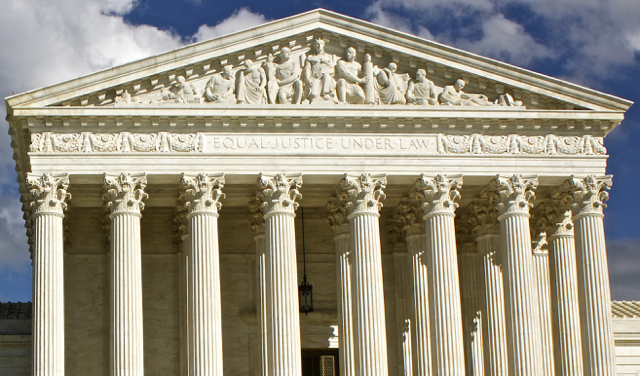The Supreme Court today told two different federal appeals courts to uphold state pro-life laws following the Supreme Court decision to overturn Roe v. Wade.
With the Dobbs decision to overturn Roe, the nation’s highest court gave states the latitude to pass their own laws on abortion. And with that, the Supreme Court instructed two appeals courts to re-evaluate their decisions on state pro-life laws since their decisions are no longer proper under the Dobbs decision.
The U.S. Supreme Court’s decision Thursday to vacate a decision from the U.S. Court of Appeals for the 8th Circuit’s in Rutledge v. Little Rock Family Planning Services and remand it back to that court to re-evaluate its ruling in light of the Supreme Court’s decision. The 8th Circuit had suspended enforcement of Arkansas laws protecting unborn life after 18 weeks in gestational age, prohibiting abortions simply because the baby may have Down syndrome, and requiring abortionists to be board-certified or board-eligible in obstetrics and gynecology
Alliance Defending Freedom Senior Counsel Denise Harle hailed the decision.
“Every human life is worthy of protection; Arkansas’ laws protect both unborn children and women. And now that the Supreme Court has returned policy decisions of this sort to the states, we trust that the 8th Circuit will conclude that Arkansas’ laws protecting unborn children, the health of pregnant mothers, and the integrity of the medical profession are legitimate,” she said.
Click Like if you are pro-life to like the LifeNews Facebook page!
Harle beleives the appeals court will uphold the law now.
She told LifeNews: “Two of the three 8th Circuit judges who ruled against Arkansas felt bound by the Supreme Court decisions in Roe v. Wade and Planned Parenthood v. Casey but expressed their deep concern for the error of those decisions, noting that ‘each human being is priceless beyond measure.’ States—including Arkansas—have a valid interest in ensuring that their laws respect the life and dignity of the unborn and are protect the health of women based on the latest science.”
Meanwhile, SCOTUS decided to vacate the U.S. Court of Appeals for the 7th Circuit’s decision in Box v. Planned Parenthood of Indiana and Kentucky, instructing that court to re-evaluate its ruling. That was a lower court ruling against an Indiana law ensuring that parents are notified if their minor children seek an abortion.
Harle also commented on this decision.
She told LifeNews: “The well-being of both babies and young women is more important than the bottom line of abortionists. All this law has sought to do is uphold the duty and desire of parents to protect their own children rather than allow them to be taken advantage of by others. We trust that the 7th Circuit will conclude, now that the Supreme Court has returned policy decisions of this sort to the states, that Indiana’s law ensuring that parents have the opportunity to be involved in their children’s life-changing decisions is legitimate. No one should desire to prevent a pregnant mother from understanding the true implications of an abortion procedure.”
As LifeNews reported, the Supreme Court has overturned Roe v. Wade, with a 6-3 majority ruling in the Dobbs case that “The Constitution does not confer a right to abortion” — allowing states to ban abortions and protect unborn babies. The high court also ruled 6-3 uphold the Mississippi 15-week abortion ban so states can further limit abortions and to get rid of the false viability standard.
Chief Justice John Roberts technically voted for the judgment but, in his concurring opinion, disagreed with the reasoning and said he wanted to keep abortions legal but with a new standard.
Texas and Oklahoma had banned abortions before Roe was overturned and Missouri became the first state after Roe to protect babies from abortions and South Dakota became the 2nd. Then Arkansas became the third state protecting babies from abortions and Kentucky became the 4th and Louisiana became the 5th and Ohio became the 6th and Utah became the 7th and Oklahoma became the 8th and Alabama became the 9th. This week, Mississippi became the 10th and South Carolina became the 11th,Texas became the 12th with its pre-Roe law and Tennessee became the 13th.
Michigan, Wisconsin and West Virginia have old pro-life laws on the books but there is question about whether they are applicable and will be enforced.
Ultimately, as many as 26 states could immediately or quickly ban abortions and protect babies from certain death for the first time in nearly 50 years.
The 13 total states with trigger laws that would effectively ban all or most abortions are: Arkansas, Idaho, Kentucky, Louisiana, Missouri, Mississippi, North Dakota, Oklahoma, South Dakota, Tennessee, Texas, Utah and Wyoming.
“Abortion presents a profound moral question. The Constitution does not prohibit the citizens of each State from regulating or prohibiting abortion. Roe and Casey arrogated that authority. We now overrule those decisions and return that authority to the people and their elected representatives,” Alito wrote.
“Roe was egregiously wrong from the start. Its reasoning was exceptionally weak, and the decision has had damaging consequences,” Alito wrote. “And far from bringing about a national settlement of the abortion issue, Roe and Casey have enflamed debate and deepened division.”
This is a landmark day for the Pro-Life movement and our entire nation. After staining the moral fabric of our country for nearly 50 years, Roe v. Wade is no more.
Justices Sonia Sotomayor, Elena Kagan and Stephen Breyer authored a joint dissent condemning the decision as enabling states to enact “draconian” restrictions on women.
Polls show Americans are pro-life on abortion.








